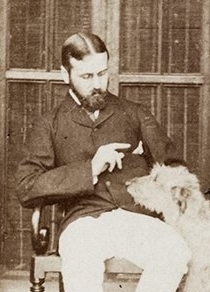Walter Hillier
This article needs additional citations for verification. (September 2016) |

Sir Walter Caine Hillier KCMG CB (1849 – 9 November 1927) was a British diplomat, academic, author, Sinologist and Professor of Chinese at King's College London.
Early life[edit]
Walter Hillier was born in Hong Kong but educated in England, at Bedford School and at Blundell's School, Tiverton. His father was Charles Batten Hillier, Chief Magistrate, Hong Kong,[1]: 147 and British Consul at Bangkok and his mother, Elizabeth, daughter of missionary Walter Medhurst.[2] He was the brother of Edward Guy Hillier, one of the most respected bankers at the Hongkong & Shanghai Bank and its long-term manager in Peking (1889-1924).[3]: 163
Diplomatic career[edit]
- 1867: Appointment to the Consular Service and service as an interpreter in China (followed by various promotions)
- 1879: Assistant Chinese Secretary in Peking (in 1883 accompanying Sir Harry Parkes to negotiate the treaty with Korea)
- 1885: Chinese Secretary
- 1889–1896: Consul-General in Seoul.[4]
Later career[edit]
Hillier retired in October 1896 and, from February to April 1901, was attached to the Legation in Peking as special political officer for Chinese affairs with the rank of acting First Secretary in the Diplomatic Service. This involved his appointment as adviser to the military authorities in China at which time he was Mentioned in despatches. A stone memorial was erected to Hillier and to a British military officer at Shan-hai-Kwan to recognise the protection afforded to Chinese during the times following the Boxer Rebellion. From 1904–1908, Hillier was Professor of Chinese at King's College London. From 1908–1910, Hillier served as an adviser to the Chinese government, in particular advising Li Hung-chan during his time as Viceroy of Zhili.
Selected works[edit]
- The Chinese Language and How to Learn It: A Manual for Beginners (1907)
- An English-Chinese Dictionary of Peking Colloquial (1910)
- Memorandum Upon an Alphabetical System for Writing Chinese: the Application of this System to the Typewriter and to the Linotype or other Typecasting and Composing Machines and its Application to the Braille System for the Blind (1927)
See also[edit]
Notes[edit]
- ^ Norton-Kyshe, James William (1898). History of the Laws and Courts of Hong Kong. London: T Fisher Unwin.
- ^ Hillier, Andrew (22 September 2016). "Andrew Hillier reflects on Three Brothers in China: Visualising Family in Empire". Visualising China. Retrieved 24 April 2019.
- ^ Pearl, Cyril (1967). Morrison of Peking. Sydney,Australia: Angus & Robertson.
- ^ Addison, Henry Robert. (1901). Who's Who Vol. 53, p. 568, p. 568, at Google Books; compare Note 12
References[edit]
- "Death of Sir Walter Hillier," The Times (UK). 11 November 1927, p. 18.
- "The Late Sir Walter Hillier," The Times 17 November 1927, p. 16.
- 1849 births
- 1927 deaths
- People educated at Blundell's School
- People educated at Bedford School
- British diplomats in East Asia
- British expatriates in China
- British expatriates in Hong Kong
- British expatriates in Korea
- Academics of King's College London
- Linguists from the United Kingdom
- British sinologists
- Knights Commander of the Order of St Michael and St George
- Companions of the Order of the Bath
- Ambassadors of the United Kingdom to Korea
